brought the O. M. T. A. to a flourishing magnitude and enthusiasm ; it is still remembered and always will be by those who participated in it, as an inspiring occasion, filled with the display of fruits gathered from the past, and decorated with blossoms of hope for the future. In conjunction with William H. Sherwood, Mr. Mattoon played at the National Association (N. M. T. A.) at Indianapolis in 1887 an elaborate and brilliant work for four hands, a pianoforte Tarantelle, Op. 21, which elicited much enthusiasm, and has been frequently played since, both in the East and the West. Of this, Mr. Sherwood, now of Chicago, expresses in writing the following opinion : "My Dear Mr. Mattoon : It gives me great pleasure to refer to your musical talent, scholarship, fancy and ability as composer and musician, as of a very high and artistic order. The bright, original and thoroughly charming "Tarantelle" (Op. 21), just played at some of my concerts with most brilliant success, is a proof of your merit. Your work for the cause of music can not fail to be productive of true progress and high art value." And again the same high pianistic authority puts this upon record: "Your compositions show the true ring, fire, conception, fine sensibility and the cultivated taste of the musician." "Your Tarantelle (Op. 21) is a very fine and effective bravura piece." In reference to Mr. Mattoon's powers as a teacher, after hearing his pupils play, Mr. Sherwood says the following : "Your playing o me last April, and the playing of yourself and a pupil last summer, showed the good methods and the thoroughness of your playing and your teaching delightfully and well." That most genial of gentlemen and enthusiastic of veteran piano teachers, Dr. William Mason, says the following : "I have received your "Joyful" and graceful "Scherzo-Caprice" (Op. 22) and have read it through with interest. It is light, airy and tuneful, and at the same time not difficult—so that I should think it would meet with much favor from pianoforte players." "The Tarantelle (Op. 21, four hands) is, I think, effective, brilliant and melodious." Arthur Foote, the pianist, and composer, resident_ in Boson, says: "The Tarantelle (Op. 21) I liked immensely at Indianapolis. It is really most effective, and grateful too." "A great many thanks for the Saltarello, which I think is very brilliant and effective." The celebrated concert organist, Clarence Eddy, of Chicago, has the following o say :'"The Deuxieme Saltarello (Op. 27) is a delightful piano piece ; brilliant, yet refined; striking, yet finished in style and treatment. It would be an effective short number in any pianist's repertory." "The Romanza is broad, rich and impassioned, with a big dramatic voice it must be extremely effective." Lastly, Fred L. Morey, of Chicago, says : "I have just made the acquaintance of your Deuxieme Saltarello and Impromptu Capriccioso. I find the pieces very interesting, melodious and flowing, and, above all, lucid. It is a pleasure to meet with two pieces displaying the spontaneity of your Opus 27 and 28."
The foregoing amplitude of quotation makes evident again and again the sterling musical qualities of Mr. Mattoon's work. The consensus of opinion from all these distinguished musicians will be found in two main thoughts—melodious grace and effective But it must not be understood that Mr. Mattoon has produced nothing but the showy calon and concert pieces for the pianoforte. He has written also some works in the more serious, classical forms—and indeed mere virtuosity never runs riot in his compositions; a the expense of noble thought. He never allows the rapture of dexterous fingers to overflow and submerge the flower-garden of the heart. An added interest and augmented merit rests also in the fact that in composition he has been his own instructor.
-JOHN S. VAN CLEVE.
- 750 -
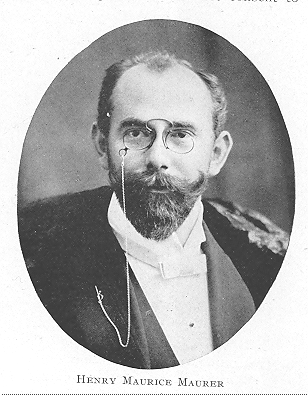
Henry Maurice Maurer, Who since his arrival in Cleveland, in August, 1903, has made an enviable record as a thorough teacher of music and conductor of singing societies, was born on the 1st of June, 1872, at Zuerich, Switzerland. His father, Thomas Maurer, was Superintendent of the railroad department of the Swiss Railroad. Mr. Maurer was educated in the city schools, both common and secondary, and the Seminary of Chur. Despite the fact that Mr. Maurer showed' a wonderful musical talent, when still a boy, his parents would not consent to give him a thorough musical training. However, Mr. Maurer, through his own energy and tenacity, secured such an education, and from 1892 to 1893 he attended the celebrated Conservatory of Music at Zuerich, where he pursued his studies under Dr. Fr. Hegar. In 1893, Mr. Maurer went to Stuttgart and entered the Royal Conservatory in that city. In that institution he studied under such masters as Dr. T. Faiszt, Dr. Scholl, Professor S. de Lange, and Professor W. Speidel. While a student at the Stuttgart Conservatory of Music, Mr. Maurer conducted the orchestra and chorus of the "Musikkranz," a musical society of seventy active members. He also for a period of one year was instructor at the Conservatory of Music, and often appeared in concerts and piano and organ recitals with marked success. During his sojourn in Stuttgart, Mr. Maurer was the recipient of five annual prizes of 500 francs each, out of the Bruegger fund, an endowment of the city of Zuerich for the most efficient musical student from Zuerich. After leaving the Conservaory of Music at Stuttgart, Mr. Maurer went to Geneva, Switzerland, where he at once became prominent in musical .circles, as director of the German Liedertafel (Liederkranz), organist and choirmaster of the Lutheran Church, and teacher of music in the famous institute of Rev. Hoffmann. He also became the conducor of the "Gruetli Maennerchor," which well-known society he directed during the reunion of all the "Gruetli-Vereine" in 1899, at Berne. The success of Mr. Maurer's chorus was so marked that he was presented by the officers of the reunion with a golden laurel wreath. In the same year Mr. Maurer received as recognition of his excellent services as a judge at the "Concours Musical du Faubourg St. Gervais," a golden medal with diploma. In 1903, Mr. Maurer emigrated to the United States, and after a short stay in New York, he came to Cleveland, Ohio. In the Forest City he met with immediate success, and he now conducts the "Liederkranz" and the "Harugari Maennerchor," "Schwaebischer Saengerbund" and "Lehrergesangverein," some of the most prominent male choruses of Cleveland. Mr. Maurer has gained the reputation of being a conscientious and painstaking teacher of extraordinary ability. His pupils belong to the very best Cleveland families. He is a composer of merit, and his compositions for mixed and male choruses have become known in wide circles. Mr. Maurer's studios are located at No. 327 Prospect Street, Cleveland, Ohio.
- 751 -
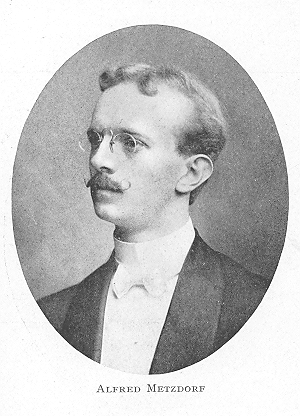
Alfred Metzdorf, Violin soloist, and teacher of music, with headquarters at Cleveland, Ohio, was born on the 21st of February, 1877, in the Forest City. His parents, Wilhelm Metzdorf and Anna Engelmann, came from Charlottenburg and Dresden, Germany, respectively, emigrated to the United States and settled in Cleveland, where their son, Mr. Alfred Metzdorf, received his musical, as well as his literary education. He graduated from the Cleveland High Schools in 1896. His teacher in violin was Mr. Henry Miller, and in piano and theory Messrs. Johannes Wolfram and Wilson G. Smith. He began teaching at the age of six-teen, while still pursuing his studies, and has met with the greatest success. His services as teacher, as well as violin soloist,- have been in great demand. He is the conductor and soloist of the Cleveland Ladies' Orchestra, a member of the Slayton Concert Bureau, of Chicago, and the Brockway Concert Bureau of Pittsburg. Mr. Metzdorf was a member of the old Symphony Orchestra under Johann Beck, and at present is the director of the Cleveland Pilgrim Orchestra. A number of his compositions, mostly songs, still remain in manuscript. On the 11th of June, 1902, he married Miss Ralphina Parsons, and lives at No. 86 North Genesee Street, while his studios are located at No. 50 Euclid Avenue, Cleveland, Ohio.
Sid H. Morey, Of Akron,. Ohio, direcor of Morey's Colonial Theater Orchestra, and teacher of music of splendid reputation, was born on the 22d of October, 1860, at Rome, Ashtabula County, Ohio. He is of Welsh ancestry, and his father, W. R. Morey, was a well-known Justice of the Peace in Ashtabula County. Mr. Morey was born and raised on a farm, and early showing a desire to make the music profession his life's work, he was instructed upon the violin, his favorite instrument, by the best teachers, obtainable, and soon displayed unusual ability, which became early recognized. When but fifteen years of age, he became connected with a theatrical orchestra, and. for the next ten years traveled all over the United States in his capacity as a violinist. About twenty years ago Mr. Morey, desiring to settle in life, began the teaching of his profession in the city of Akron, where he has continuously practiced ever since. He is considered a thorough and capable teacher of string and brass instruments, and has many pupils belonging o the best families of Summit County under his tuition. As director of Morey's Colonial Theater Orchestra, he has earned an enviable reputation, not only for himself, but for the theater with which he is connected. Politically, Mr. Morey is a Republican. In 1886 he was united in marriage to Miss Clara Elliott, an estimable young lady of Columbus. He is the father of two children—a son, Bertram, and a daughter, Ethel,
- 752 -
both of whom show talent for their father's art. Mr. Morey resides at No. 237 South High Street, Akron, Ohio, where his studios are located.
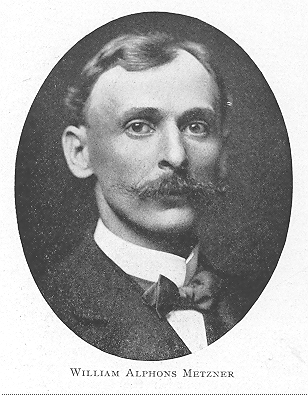
William Alphons Metzner, A well-known musician of Dayton, Ohio, was born on the 19th of May, 1867, in the province of Silesia, and emigrated to this country in 1884, landing in the city of New York, at which place he first took up his profession in his adopted country. He is the son of William Metzner, who followed. the profession of teaching. The son, William Metzner, was educated in the Gymnasia of Tropau and Teschen, and his musical training was obtained under private tutorship at home. After landing in this country, he remained in the city of New York for nine months, when he removed to the northern part of New York State. He came to the State of Ohio in 1892 and settled in Dayton, where he immediately became connected with the band of the National Military Home. He soon attracted the attention of the musical community, and was made conductor of the National Home Theater-Orchestra, as well as of the Harugari Liederkranz, a leading singing society of the Gem City. He is also a skilled organist, and occupies the position of organist and choirmaster in Trinity Church, Dayton. Mr. Metzner is the composer of a number of compositions, marches and songs, some of which contain no small degree of merit. Socially, he is a member of the Modern Woodmen of America and the American Federation of Musicians. In 1888 he married Miss Emma Jasper, this union resulting in. the birth of two daughters and one son. Mr. Metzner resides with his family on Lakeview Avenue, and has his office in the National Military Home.
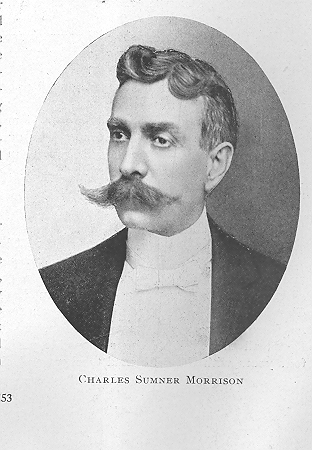
Charles Sumner Morrison, Who for several years has been conductor of Morrison's Band, at Ottawa, and who occupies the position of Supervisor of Music in the public schools of Ottawa, Ohio, and Leipsic, Ohio, was born at Senecaville, Guernsey County, Ohio, on the 8th of March, 1860. He began the study of music at the age of six years as a pupil of his father, who is still living, and who has been a thorough musician
- 753 -
and teacher of music all his life. Mr. Charles S. Morrison attended the schools of his native town, and under his father's tuition pursued his studies in music until he reached the age of fifteen years, when father and son started in the business of conducting conventions and doing concert work, the young man playing the piano at all entertainments given. From the beginning of his musical studies, young Morrison studied hard and faithfully, and while on the road devoted himself to the study of musical theory, harmony, thorough bass, composition; musical history and all that pertains to music, to obtain a general knowledge of the profession. In 1880 he started out for himself as an instructor in band and orchestra work, and has since filled many positions of importance in the Western and Middle Western States. In 1884 he accepted the position of director of music in the schools of Golconda, Illinois, and was director of the Egyptian band while located in Golconda, a period of eight years. While located at the above-mentioned place he did much outside work instructing and conducting bands and orchestras at other points. He also held the position of Vice President of the Music Teachers' Association of Illinois. In 1892 he was tendered the position of musical direcor of the Fayette Normal University at Fayette, Ohio, Which he accepted and remained there six years. While a resident of Fayette he was elected to the position of Chairman of the Executive Committee of the Ohio Music Teachers' Association, a position he filled for two terms, and he was appointed one of the examiners of public school music. In 1898 Professor Morrison changed his location to Adrian, Michigan, where he connected himself with Adrian College, as direcor of music, holding the position two years. In all his college positions he severed his connection with the institutions by voluntary resignation. After severing his connection with Adrian College he put in a year of recreation and travel on the road, representing Grinnell Bros.' music house, of Detroit, Michigan. In the years he was connected with school and college work he put in his summer vacations on the road, traveling for the John Church Music Company, of Cincinnati, Fore more than twenty-five years Professor Morrison has been an instructor in music, sixteen years as college instructor, and all that time has paid marked attention to the instruction of pupils upon the piano.
Professor C. S. Morrison is known throughout the country as a composer of music. He began his career as a writer of music in 1884, and he now has on the market one hundred and thirty compositions, consisting of productions for piano, band, orchestra, songs, studies, etc. His compositions have been placed upon the market by such well-known publishers as the John Church Company, of Cincinnati ; Oliver Ditson & Co., Boston ; the S. Brainard's Sons Company and the Thompson. Company, Chicago ; Harry Coleman, Philadelphia ; the Treloar Music Company, Mexico, Missouri, and C. G. Conn, Elkhart, Indiana. His compositions are always in demand on the market. The Professor has prepared a text book on harmony (still in manuscript), which he regards his greatest effort in the line of composition.
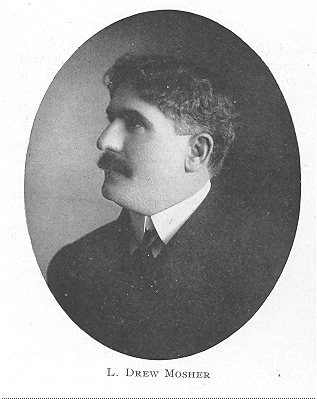
L. Drew Mosher, The celebrated vocal teacher, now of Cleveland, Ohio, was born in Lowell, Massachusetts, on the 15th of October, 1862. Ever since a child he has made music a life study, and gained the enviable reputation of one of America's best tenors and teachers of singing. At- ten years of age he was made leading boy soprano at St. Ann's Episcopal Church, Lowell, and from then on began serious study with the best teachers in Lowell. At the age of twenty he went to Boston, and for two years and a half studied with Albin R. Reed ; all this time holding responsible positions in the best churches of that city. After four years with the celebrated teachers and singers, Charles F. Webber and C. R. Adams,
- 754 -
and two years as assistant teacher with the former gentleman, Mr. Mosher took up one year of study with Mr. Courtney, of New York City. Such remarkable progress had been made that Mr. Mosher then thought it best to seek European teachers, and concluded to study with Frau Sophie Foerster, of Munich, Germany, one of the most celebrated prima donnas and teachers of singing in Europe. After studying four years with her, he then went for one year of work with Shriglia in Paris, completing his European study with Sims Reeves, of London, the noted English tenor. Upon his return to America he located in New York City, where for one year he taught singing and gave up much of his time to concert work. Receiving a call to the Oberlin Conservatory of Music, he accepted, where for ten years he was instructor of voice culture and singing. Mr. Mosher's present location is a permanent one, where he has built up a large business. Many of the prominent singers in the city being his pupils. Mr. Mosher's repertoire is a broad one, having studied all classes of music, operas and oratorios, and the classics of old and modern school.
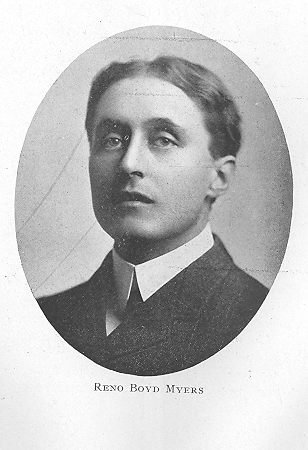
Reno Boyd Myers, Of the Findlay College Conservatory of Music, teacher of piano, organ, theory and history of music, and organist of the First Presbyterian Church at Findlay, Ohio, is a native of the Buckeye State. He was born on a farm near Smithville, Ohio, the son of John W. Myers and Jane A. Bricker Myers, natives of Pennsylvania. Young Myers manifested early a remarkable talent for music, and received a very careful training. He obtained his education in the public schools, Smithville Normal School and the University of Wooster, where he remained for three years. He also attended the Musical Department of the Uni-versity of Wooster, from which he graduated in 1891 with the degree of Bachelor of Music. Mr. Myers studied piano, organ and harmony under Dr. Karl Merz four years ; piano under Dr. H. H. Haas and William H. Sherwood, two years with each ; organ under John W. Pommer, Jr., Philadelphia, two years ; and
- 755 -
theory and composition under Dr. Hugh A. Clark, University of Pennsylvania, two years. Mr. Myers entered into public life at the age of nineteen, as teacher of piano in the Broad Street Conservatory of Music, at Philadelphia, Pennsylvania, which position he filled for two years. After that he was connected with Wheaton College Conservatory of Music two years, at Wheaton, Illinois ; for one year with the Conservatory of the Liberty Ladies' College, as director, at Liberty, Missouri. For a number of years Mr. Myers has been Principal of the Piano Department of the Findlay College Conservatory of Music, and has met with great success. In the summer of 1904 he was elected director of the Conservatory of Music of said college. Mr. Myers belongs to the Methodist Church. On the 26th of June, 1895, he was married to Miss Lulu Dell Carrothers. They have one child, Cecilia Marie Myers.
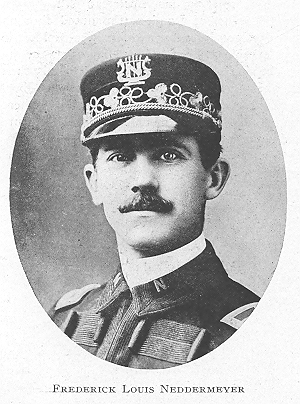
Frederick Louis Neddermeyer, Conductor of the Empire Theater Orchestra, leader of the Neddermeyer Military Band and one of the foremost musicians in the city of Columbus, Ohio, is of German parentage, and was born in the capital city of Ohio on the 4th of July, 1866. His father, Frederick Neddermeyer, a well-known hotel-keeper, was a native of Hanover, Germany ; his mother, Doretta Boese, coming from Wunsdorf, Germany, to this country in 1851. Mr. Neddermeyer received a careful education in his youth, and displaying marked musical abilities and a keen desire for a finished education in that art, he was given careful tuition by the best obtainable instructors in his home city. After being thoroughly prepared, he went abroad, and at the fountain head of music, the Royal Conservatory at Leipsic, he completed his musical training, graduating in 1886. His first appearance in public occurred when he was but twelve years of age, he playing a violin solo before an appreciative audience. After his return from Leipsic, Mr. Neddermeyer became engaged in his profession in Columbus, where he accepted the position of conductor of orchestras at the Metropolitan, Grand, Henrietta, High Street and Great Southern Theaters. Mr. Neddermeyer has played an important part in the musical life of Columbus, and at present directs the orchestra at the pretty Empire Theater and Neddermeyer's Military Band. He is a composer of a number of compositions of no small degree of merit, some of which follow : "The Doll Part," "Bianca," "Hotfoot Sue," "The Bismarcks March," and other well-known band and orchestra numbers. Socially, Mr. Neddermeyer belongs to several branches of the Masonic fraternity, and he is Vice President of Local 103, American Federation of Musicians. His wife's maiden name was Loretta Barrett, and his only child, a girl, was named Gayle Barrett Neddermeyer. Mr. Neddermeyer's abilities as a teacher, conductor and soloist are acknowledged, and can be largely attributed to the excellence of his instructors while at the Leipsic Conservatory, he being under the personal
- 756 -
direction of such famous musicians as Sitt, Brodsky and Hei-mann, who were his violin instructors, and Reinecke, under whom he studied ensemble playing.

Jean Auguste Parre, The leading teacher of violin and violin soloist in the northwestern part of Ohio, was born of French parentage in New Orleans on the 13th of March, 1871. As a child of six he beg-an his work on the violin, his mother and uncle giving him his first instructions. Four years later he was placed with Professor Boutiphier and then with Max Kayser, of the. Conservatory of New Orleans. His work with the Conservatory continued until he was seventeen, when he was engaged to fill a position as instructor at Kagger's College at Denison, Texas. He remained in Denison for three years, when he went to the N. T. F. College for two years. At the close of the latter work he went o New York and studied repertoire with Carl Richter, Augusta Arnold and Ovide Musin, and finally went abroad o finish his musical education under Adolfo Betti and the world-renowned Cesare Thomson, of the Roy-al Conservatory of Brussels, Belgium. Mr. Parre spent two years on the concert platform, traveling through the South and West. He remained one year at Charlotte, North Carolina, from which city he removed o Toledo, where he has made his permanent home. Since he came o Toledo he has been indefatigable in the pursuit of the best in violin methods, in violin development and in the practice of the works of the modern violin soloists. He brings to his art the French versatility and expression and the warmth and color which characterize the French as a nation. As an artist he has no superior in Toledo, and he has been connected in a prominent way with the Toledo Conservatory of Music and the Toledo Symphony Orchestra. He has been successful in imparting his own knowledge o students, and gets from them a purity of tone that is at all times the test of the violinist's ability. He has always appeared in public with marked success. He has written a work of technique for modern virtuosity that advances his pupils remarkably fast. Though he has not published it, he teaches it by correspondence, and has all his pupils memorize it for daily work. His studios are located in the Zenobia Building, Toledo, Ohio.
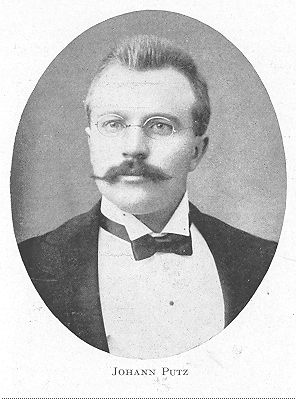
Johann Putz, Head of the violin department of the West Side College of Music, at Cleveland, Ohio, and one of the foremost teachers of violin and violin soloists of the Forest City, is a native of Austria, born at Lauterbach on the 24th of April, 1872, the son of Leonhard and Annie Putz. Mr. Putz when quite young, demonstrated a great musical ability, and at the early age of but six years he commenced the study of the violin, which instrument has
- 757 -
always been his favorite in later years. That he has received a most exceptional education in music, and that his methods must be of the very highest order, is conclusively shown by the fact that masters like Ernst Lange, the great Joachim and Wilhelmy, Karl Riekeisen and Johann Hahn were his tutors, under whom he studied for a number of years. Thoroughly grounded in the principles of theory and harmony, as well as mastering the violin, Mr. Putz, at the age of fifteen, went to Ailenburg, Germany, where he became connected with an orchestra, and one year later he was given a direcorship of an orchestra in Vienna, playing solos at the same time. From there he went o Sessen, Germany, where he was engaged in the same position. Shortly after Mr. Putz concluded to emigrate to the New World he crossed the ocean and located in Milwaukee, where as a violinist he soon attracted attention, he being connected with Christoph Bach's Symphony Orchestra in that city. Spending a period in Philadelphia, he finally made his permanent home in the city of Cleveland, Ohio; becoming immediately identified with the reading musical interests of that city, During the existence of the Cleveland Symphony Orchestra, Mr. Putz played first violin in that famous body. At the present time he has charge of the violin department of the West Side College of Music. He is recognized as one of the leading violin teachers in his part of the State, and having an experience of over fifteen years, his instructions are thorough, exact and most gratifying to the institution with which he is connected. The orchestra of the Lyceum Theater is directed by him. He resides with his wife, a former Miss Louisa Mock, and two children, Lucilla and Leonard, at No. 39 Brainard Street, Cleveland, Ohio.
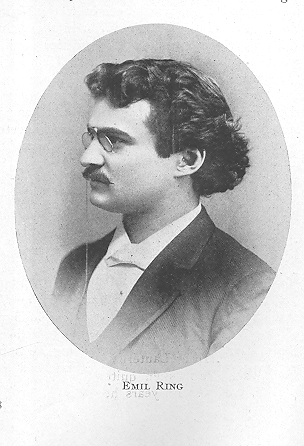
Emil Ring, Among the most noted musicians of Ohio Mr. Emil Ring, of Cleveland, Ohio, stands in the first rank. He is a musician of National reputation. Mr. Ring was born in Tetschen- on-the-Elbe, a small village in the northern part of Austria, in what is known as Saxonian Switzerland, on the 21st of November, 1863. He obtained as good an education as the public schools of his native town afforded, and at the age of ten years took up the study of harmony
- 758 -
and vocal music, and also the use of the flute and clarionet. His parents had entertained the idea of some other calling for him, and were disappointed at his choice of a vocation. In 1875 Emil Ring went o Dresden, where he received his first scientific training under Edmund Kretschmer, the well-known composer. Here he became a member of the Royal Saxonian church singers, as boy soprano, singing for over three years in the Catholic Court Church. He was then obliged to abandon his profession for a time, on account of the changing of his voice, and spent the interim in attendance at a gymnasium (high school). Afterwards he continued his musical studies under Kapellmeister Karl Krebs, a celebrated conductor of church music, becoming proficient in the study of harmony and theory. Next he went to Prague, the capital of Bohemia, and entered the Conservatory of that city, his previous training enabling him o complete the regular six years' course in four years. At this time he was twenty years of age, therefore he had o enter the army of his country and served one year. Near the end of the year 1884 he passed a severe examination, and was made a Lieutenant of Reserves. At the close of his military career he joined a musical organization then in the zenith of its fame, namely the Mansfelt Orchestra, which had its headquarters in Dresden. During the following season, Mr. Ring traveled throughout Germany and Belgium, visiting all the large cities and participating in the concerts given by the orchestra. The next two years were spent in England, in,study, and during the latter part of 1886 Mr. Ring moved o Berlin, and while there he .received an offer o become a member of the Boston Symphony Orchestra, which he accepted, first setting foot on American soil in March, 1887. The next year he was engaged o conduct the Cleveland Philharmonic Orchestra, and he accordingly arrived in that city in September, 1888. Since that time Mr. Ring has been engaged in his profession in the Forest City. He is connected with many of the musical organizations of the city, and is the conductor of the Cleveland Gesangverein, the oldest and most noted singing society west of Philadelphia, having been founded in September, 1854. In the summer of 1893, Mr. Ring was the conducor of the great Saengerfest of the North American Saengerbund, held in Cleveland. The conducting of this most successful feast of song gave Mr. Ring a National reputation. Mr. Ring has many friends and admirers, not only in the city of his adoption, but also all over the State of Ohio.
C. E. Reynolds, Organist and choirmaster of Trinity Church, Newark, Ohio, was born in 185o at Torono, Canada. He is of English descent, and the son of a business man of that city, who was also the organist in one of the leading churches of Toronto. Mr. Reynolds received his early education in the schools of his native city, and was instructed in music by the celebrated John Carter. At the age of nineteen years, he left Canada, coming to Rochester, New York, where he became a teacher of music, as well as organist and choirmaster in the churches of that city, remaining there for a period of ten years. From Rochester, Mr. Reynolds went o Chicago, where for ten years he was organist and choirmaster in the St. James Church, the mother church of the Episcopalian congregations of that city. For the past eight years Mr. Reynolds has filled the position as organist and choirmaster in Trinity Church, Newark, Ohio, where he has done splendid work. His choir is considered one of the very best in the central part of Ohio. Mr. Reynolds is the father of three sons and one daughter, having lost his wife about sixteen years ago. Two of his sons are well-known musicians, who are now engaged in their profession, one of whom is the assistant of his father in his church work. Mr. Reynolds is recognized as a thorough musician and an organist and choirmaster of more than ordinary ability. His residence is located at No. 32 North First Street, Newark, Ohio.
- 759 -
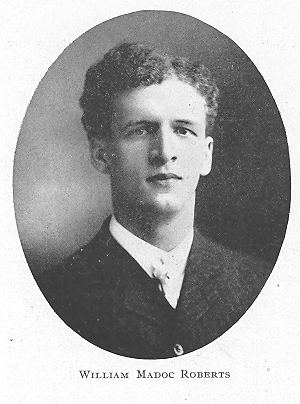
WILLIAM MADOC ROBERTS, A prominent musician of Cleveland, Ohio, was born on the 5th of September, 1879, at Manchester, Ohio. He is the son of Joseph T. Roberts and Ruth Lloyd Roberts, natives of North Wales, England, who emigrated o the United States in 1870. The father pursued his avocation as an engineer and educated his son in the public schools of Cleveland', in which city Mr. Roberts graduated in 1895, from Stanard School. Like most of the descendants of Welsh parents, Mr. Roberts showed a keen and early talent for music, and at the age of six years appeared in public recitals. He consequently was given a careful musical education, at the conclusion of which he started his career as a teacher of music and organist of the Euclid Avenue Baptist Church, of which he is a member. Notwithstanding his youthful age, Mr. Roberts is considered o be one of the most successful and con-scientious teachers in the Forest City. On the 3d of December, 1903, he married Florence Anna Dellenbaugh, a resident of the city in which he practices his chosen profession. Mr. Roberts is the composer of a number of pieces for piano, organ and voice. Mr. Roberts resides at Highland Terrace in East Cleveland, while his studios are located at No. 122 Euclid- Avenue, Cleveland, Ohio.
Walter H. Ross, Of Dayton, Ohio, a teacher of music of reputation in his city, was born on the 27th of March, 1876, at Germantown, Ohio, where his father, J. Ross, was engaged in the grocery business. Both his parents were native Ohioans, of German-Scotch descent. Mr. Ross was educated in the schools of his native city, graduating from High School with the class of 1898. When quite young he manifested an undoubted ability for music, and was conse-quently placed under the tuition of Professor Lotter, of Chicago, and Mr. Blumenschein, of Dayton. Later, to finish his musical training, he came to Cincinnati, entered the Cincinnati Conservatory of Music, where he was under the preceptorship of Messrs. Shailer-Evans and Barber. After leaving the Cincinnati Conservaory of Music, Mr. Ross came to Dayton, where he 'engaged in the profession of teaching. Since that time he has taken an active part in the musical affairs of Dayton. His studios are located at Sixth and Jackson Streets, where he teaches large classes the principles of piano playing and har-mony. Mr. Ross is organist of the Memorial Presbyterian Church of his city and leader of the quartet of that congregation. As a conscientious and painstaking teacher, he has gained an enviable reputation.
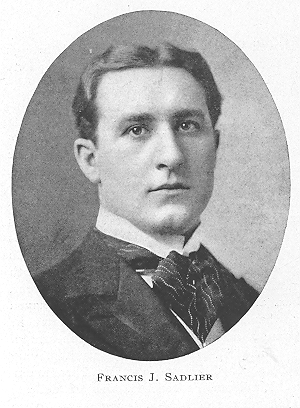
Francis J. Sadlier, One of the foremost singers of Cleveland, was born in Cleveland on the 22d of September, 1878. His father was of English-Irish descent, and his mother of German. Mr.
- 760 -
Sadlier was educated in the Cleveland public schools and South High School. He then went to work in Burrow Bros.' book store, but got interested in music, and on the advice of a friend, Mr. Gus Shields, took up the study of voice culture. He later retired from the book business, and took a thorough course in musical theory, harmony and interpretation under Hermann O. C. Kortheuer. He was engaged as basso at Pilgrims Congregational Church and later accepted a like position in the choir of Unity Church. Mr. Sadlier then left Cleveland and spent two years in New York, where he studied singing under John Dennis Mehan. In New York he was engaged as solo basso of Calvary. M. E. Church, and he also sang a season in opera.. Returning to Cleveland in the summer of 1904,. he opened a studio for voice culture in the Arcade. He has accepted a position in the new Unity, Church, and will be heard in recitals and concerts. He is widely known in the East and Middle West as an opera and oratorio singer, and for interpretation of the classic German Lieder. His voice is a basso-cantante. He began singing in 1898, and was one of the soloists at the Saengerfest in Akron in September, 1904. Mr. Sadlier will spend several years in Cleveland, and then continue opera singing in Germany. He speaks German fluently:
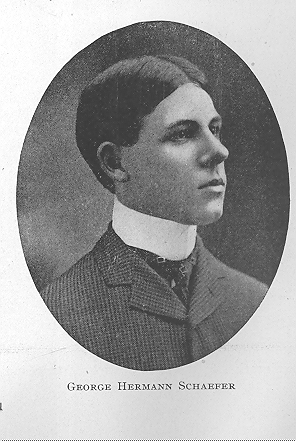
George Hermann Schaefer, A young and talented pianist of Sidney. Ohio, was born on the 2d of July, 1882, at the above-mentioned city. He is the son of George Schaefer, a former citizen of France, who was born in the province of Alsace, his mother coming from New Bremen, Ohio. His father took part in the Franco-Prussian War, and emigrated to this country in the year of 1872, refusing o become a German subject and to enter the German army after the conquest of the country in which 'he was born and raised. Mr. George Hermann Schaefer was educated in the public schools of Sidney, Ohio, receiving his musical training under private teachers and at the Cincinnati Conservatory of Music, where he was a favorite pupil of the great pianist, Theodore Bohlmann, one of the best-known teachers in the city of Cincinnati, under whose preceptorship he was a student for two years. Returning o Sidney, he immediately
- 761 -
took up his chosen profession. Mr. Schaefer is well known in musical circles all, through this part of the State, and is connected with the Piqua Conservatory of Music in the capacity of teacher of piano. His residence is located at Sidney, Ohio.
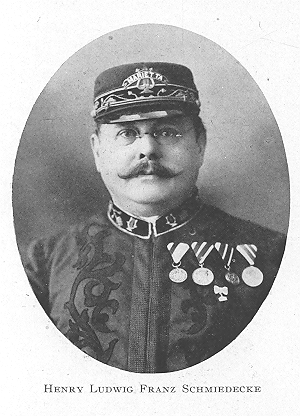
Henry Ludwig Franz Schmiedecke, A leading musician and teacher of music at Marietta, Ohio, was born on the 1st of January, 1844, in Sondershausen, Germany, the son of Carl Schmiedecke and Henrietta Grille Schmiedecke. When a boy, Mr. Schmiedecke manifested a very remarkable talent for music, and his parents gave him every opportunity o develop the same under direction of the very best teachers. Mr. Schmiedecke obtained his literary education in the Latin School of Sondershausen, while his musical training was finished in the Conservaory of Music of his home city, which was under the directorship of the celebrated Edward Stein. In early youth Mr. Schmiedecke began his musical career, when, at the age of but ten years, he played in a band for dances. Five years later he became a member of the court orchestra of the Prince of Saxony Sondershausen, playing second oboe. The first oboist, Emil Hoffmann. Mr. Schmiedecke's teacher, was of delicate health, and on account of sickness was often unable o fill his place in the orchestra. On those occasions young Schmiedecke had to play first oboe, and often he had to play very difficult parts without having had any rehearsal. In those times musical heroes like Richard Wagner, Franz Liszt, Hans von Buelow, Rubinstein and Brahms were at the zenith of their brilliant careers, and they often came o the court of Sondershausen, where they not only appeared in the celebrated Lohconzerts, but also rehearsed and directed their new compositions. Mr. Schmiedecke had the honor to often play under the direction of these great masters, and it goes without saying that the time he spent in the court orchestra of Sondershausen was a very good: school for him. Later Mr. Schmiedecke entered the army and took part in three wars—the war of 1864, against Denmark the war of 1866, against Austria, where he participated in the battle of Langensalza, and finally, in 1870-1871, in the Franco-Prussian War: During this tremendous struggle Mr. Schmiedecke took part in the sieges of Metz and Paris, also in a number of the most bloody battles. After the conclusion of the Franco-Prussian War, Mr.. Schmiedecke came to Bremen, where he entered the orchestra of the Bremen City Theater as first oboist. He also played the first violin in the Philharmonic concerts at Bremen. During his stay in that city, Mr. Schmiedecke founded a Symphony Orchestra and a mixed chorus of one hundred and forty voices, directing same for a period of nine years, and he also played for five years under the direction of Hans von Buelow and for the same length of time under Anton Seidl. The last five years prior to his emigration to the United States, Mr. Schmiedecke was director of the Tivoli Theater and
- 762 -
of the Tonhalle, at Bremen. Coming to America to visit a sick sister at Pittsburg, Mr. Schmiedecke took up his residence in the Iron City, where he soon became identified with the musical interests of the city. He played under Archer's direction in the Pittsburg Symphony Concerts, was director of the Grand Army Band, the Austrian Music Band, and of seven singing societies. In 1899 Mr. Schmiedecke accepted a position as director of the Marietta Band, which under his conductorship became the most popular musical organization in the southeastern part of Ohio. He enjoys the reputation of being a thorough and painstaking teacher of music and languages, teaching both German and French. As a composer he is well and favorably known, he having given to the musical world the following productions : American Overtures Nos. 1, 2 and 3, Souvenir de Chopin, a Valse Caprice, "In the Blacksmith's. Shop," Idylle, and other band and orchestra pieces. Mr. Schmiedecke is married, and resides in the pretty city of Marietta.
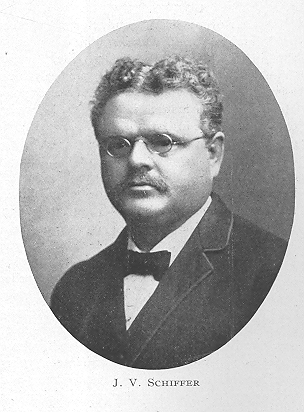
J. V. Schiffer, Teacher of music at Portsmouth, Ohio, was born on the 25th of December, 1851, in Strassbessenbach, Bavaria. He is the son of Francis. and Elizabeth Schiffer (nee Aulbach), both natives of the country in which their son was born. His father was professor of music and a graduate of the Royal Conservatory of Music at Leipsic, Germany, who was a noted organist in the '50's and '60's in this country. The parents of Mr. Schiffer emigrated to America in 1844, but returned o Bavaria in 1851, where their son was born. In May, 1852, the family again came to the United States, where they have ever since resided. The elder Schiffer, besides being an organist, taught school for thirty-three years, both public and parochial. His son received his entire education from him, both literary as well as musical. When but fifteen years of age he 'obtained his first certificate o teach school, and accepted a position in Indiana. At the age of twelve he is found playing the organ in a church. A special stool had o be made for him so that he could reach the pedals. For a period of twenty-five years he has been a teacher in the schools of the State, and for the past forty years has been an organist and a director of singing societies for over thirty years. In 1874 he founded a German newspaper, "Stern des Westlichen Ohio," at Minster, Ohio. He edited this paper while he was teaching school in that city. He also founded the German Catholic newspaper, "Glocke," published in Evansville, Indiana, in 1881. "The Daily Kentucky Democrat," a German newspaper, published in Covington, Kentucky, was also founded by him in 1891. This publication was continued until 1897. He is the author of a geography for beginners in school, called "Lightning Geography ;" also of a German song book o be used for children in German parochial schools, as also composer of songs and masses for mixed choirs. In political life he is a Democrat. He was City Clerk of Minster, Ohio, from 1875 to 1879 ; was elected
- 763 -
to the City Council of Covington from the Seventh Ward and from the Tenth Ward, serving three terms, from 1886 to 1890. He was the Democratic nominee for Mayor of Covington, Kentucky, in 1890, and was defeated by but 147 votes. He was Chairman of the Democratic City Executive Committee of Covington in 1892, and largely by his efforts a clean sweep was made. During different campaigns he made many speeches in German and English. As a director of numerous singing societies he took part in many National Saengerfests. He was Grand Secretary of the German Catholic Benevolent Society of the United States for three terms. Miss Eleanora Oyler, of Harrison, Ohio,. became his wife in 1872. He is the father of six children, and, at the age of fifty-two he is the grandfather of seventeen grandchildren. At present he is connected with a music store at Portsmouth, Ohio, and is organist at St. Mary's Church and director of the Germania Maennerchor, of that city.
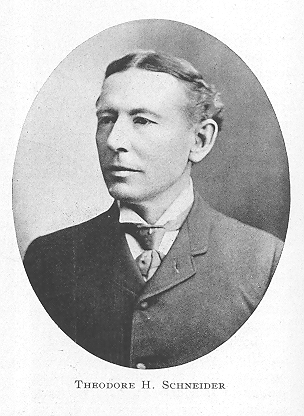
Theodore H. Schneider, Teacher of music and conductor of choruses in Columbus, Ohio, was born in the year of 1848 in the little village of Granville, Licking County, Ohio. He comes from musical stock, His father, Carl Schneider, a native of Saxony Meiningen, Germany, was a well known teacher of music in Granville and Newark. His mother was born in Wuertemberg. Mr. Theodore Schneider was educated in the schools of his home town. His father early instructed him in the profession which he now follows, thoroughly teaching him in organ and piano. while Mr. Carl Bergner, of New York, the celebrated 'celloist, was his teacher on the 'cello. Mr. Schneider started in public life at the age of twenty-five years as a teacher of music in the city of Columbus, and soon became identified with the musical interests of the capital city of Ohio. He was conductor of a number of the best choruses and singing societies of Columbus, and for sixteen years was musical director of the Liederkranz and for twenty-two years director of the Columbus Orpheus, a choir which gained a National reputation under his leadership. He is now conductor of the United Singers of Columbus, a combination of all the principal German singing societies of that community. He is also connected with the music firm of Mohr & Brock, located at No. 172 South High Street, Columbus. Mr. Schneider is the composer of a number of songs for male choruses and piano pieces. He is the father of one son and two daughters, and resides at No. 231 Deshler Avenue, Columbus. Mr. Schneider has done more than any other musician for the development of music in the Capital City, and his efforts are appreciated by a thankful and numerous people.

Otto Falke Scholz, A prominent musician of Lima, Ohio, and manager of the Scholz Institute of Music of that city, is a native German, born in 1872 at Halberstadt, Saxony. He received a very
- 764 -
careful education in the schools of his home city, attended the Gymnasium (High School) of Leipsic, from which institution he graduated in 1889. Mr. Scholz when still a child showed a remarkable talent for music and began the study of this beautiful art when quite young. After his graduation from the Gymnasium he studied for two years in the Royal Conservatory of Music at Leipsic. He afterwards went o Berlin and studied piano and piano methods with the celebrated Dr. Oscar Raif. After finishing his musical edu-cation, Mr. Scholz began his career as teacher of music. In 1897 he came o New Castle, England, stayed for a while in Edinburgh, Scotland, and emigrated to the United States in 1898, where for a while he taught in Milwau-kee and different other cities. He is at present manager of the Scholz Institute of Music at Lima, and has met with gratifying success.
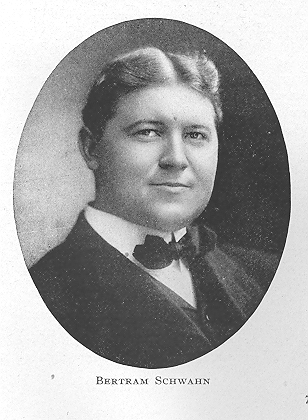
Bertram Schwahn, The accompanying picture is a good lik,tness of one of the most prominent vocal artists in the northwestern part of Ohio, Mr. Bertram Schwahn, whose studios are located in the Zenobia Building, Toledo, Ohio. Mr. Schwahn is 'a native of the State of Michigan, where he was born, reared and educated. When but a boy his beautiful voice attracted widespread attention, and he gave evidence of an unusual musical talent. He therefore was given not only a careful literary education, but also received a thorough musical training under competent teachers, who early developed his natural talent. For many years, Mr. Schwahn has practiced his profession in the city of Toledo, where he is recognized by press and public as a teacher and vocal soloist of the most pronounced attainments. His voice is a barytone of wide range, of rare purity and flexibility, sweetness and power. Since he has made Toledo his home, he has met with the greatest success, and he has for his pupils the sons and daughters of the best families in his home city. He is a conscientious teacher and a thorough musician.. Innumerable times Mr. Schwahn has appeared in concerts in large cities, and he has always succeeded in arousing his audiences to great enthusiasm. He has a host of friends and admirers in Toledo, and undoubtedly there is a brilliant future in sore for him.
- 765 -
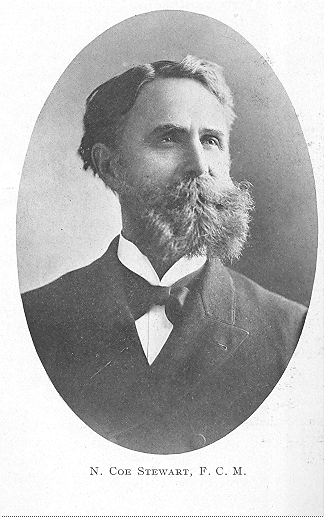
N. Coe Stewart, F. C. M., A former resident and music teacher of Cleveland, Ohio, located in the Forest City in 1865, as Co-Principal of the Cleveland Conservatory of Music, taking special charge of the vocal and teachers' departments. For thirty-six years Mr. Stewart was Director of Music in the Cleveland public schools, resigning in June, 1903, o accept a position in the American School of Opera, a private voice, singing and teachers' training school in New York City. As organist, choirmaster, choral director and in all musical enterprises, Mr. Stewart was among Cleveland's most prominent musicians, while his famous Star Course, concerts, festivals, and monster choruses will never be forgotten. He is the author of a number of musical works. His "Methods in Music Education" secured for him both National and International reputation. As Principal of the Ohio Normal Music School, President many times of the Ohio Music Teachers' Association, President of the Music Teachers' National Association, President three times of the Music Department in the National Educational Association, Examiner in the American College of Musicians, etc., etc. Mr. Stewart's services and name have become universally known for all that is good and excellent.
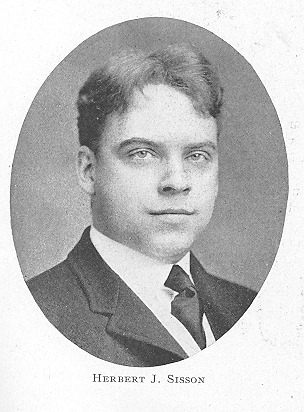
Herbert J. Sisson, The well-known organist of Cleveland, Ohio, was born on the 21st of September, 1878, at Cumberland, England. He is a thorough musician, and has been the accompanist at various times of some of the best artists that appeared before the American public, such as Clementine De Vere Sapio, Plunket Greene, Catherine Bloodgood, Emma Juch, Mabel. Crawford, Julian Walker, Emilio de Gorgoza, Emma Bussert, Heinrich Meyer, Louise Clary, Evan Williams, George Hamlin, Theodore Vam York, Carl Dufft, and Corinne Moore Lawson. Mr. Sisson came to Cleveland in August, I9o', and the following October accepted the position as organist of Epworth Memorial M. E. Church in that city. The seasons of 1901 to 1903 he was accompanist of the Singers' Club, and for the past two seasons he has been accompanist and organist for the Harmonic Club, containing one hundred and fifty voices, which society renders two oratorios each season. His services as a concert organist and accompanist are in great demand, and his series of free organ recitals at Epworth Memorial M. E. Church each year have taxed the seating capacity of that edifice. Mr. Sisson left in May, 1905, for Paris, where he spent the summer as a pupil of the great Guilmant. As a teacher of piano and organ, Mr. Sisson has acquired a reputation for successful tuition second to none in the Forest City. He always enjoys a large class of students of the best Cleveland families. His studios are located in the Arcade Building, Cleveland, Ohio.
- 766 -
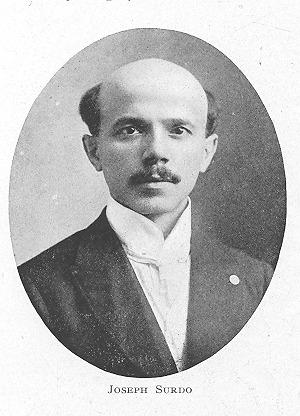
Joseph Surdo, The brilliant young violinist, Joseph Surdo, is, like many of those who in America fight the battles of the Beautiful, of European blood and birth. He is an Italian, and carries in his every fiber the esthetic instincts of that gifted race. He was born in Brindisi (in the Appenines) in 1868. His very infancy was steeped in music, and his ancestors had been celebrated in music, sculpture and painting. The family came o New York in 1873, and here the little lad was put to the systematic study of the violin under an Italian named Egidio Marone. The first lessons were given by "rote," viz., by ear ; and an anecdote of that time is worth preserving for the humorous testimony which it bears o his instinctive grasp of music. One of the popular songs of the day caught his fancy, and he practiced it. His teacher, passing by the house, overheard it and went o his father, saying in an aggrieved tone: "Why didn't you tell me you had engaged another teacher for the boy?" The father said : "I have not." Marone answered: "Well, he is playing something I haven't taught him." The Surdo family removed to Cincinnati in 1878, and here Joseph, a lad of ten, began the serious study of violin-playing and musical theory. His mother, however, with a wise breadth of intelligence, thought her son would be a better musician for a literary education. He was, therefore, sent for two years o an admirably conducted military school in Gambier, Ohio, from which he was graduated in 1886. Returning to Cincinnati, he entered Woodward High School, and graduated in 1889. He now applied himself exclusively o his chosen vocation, the art of music, and, entering the College of Music, spent six years under the learned professors of that institution, and graduated with eclat in 1895. His Cincinnati instructors in the violin have been Miss Kate Funck, S. E. Jacobssohn, J. A. Broekhoven, Leandro Campanari, and Jacques Sternberg. That renowned Italian virtuoso, Campanari, places Joseph Surdo in a small constellation .of seven first-rate talents ("The Musical Pleiades") chosen out of the hundreds of violin students under his care during the six years of his distinguished service at the College of Music. Under Jacques Sternberg, a solid, classical violinist of the Ferdinand David School, and a personal friend of Wieniawski, Surdo took a post-graduate course of three years, and received the best traditions of Viotti, Kreutzer, Rode and Spohr. Under the learned theorist, J. A. Broekhoven, at the College of Music, Surdo took a thorough and extensive course in musical composition ; and under Frank Van der Stucken, Dean of the College, he studied composition and directing. Surdo was for three seasons (1893-4-5) director of the Price Hill Orchestra ; for a number of years conductor of chorus at the Epworth Heights Encampment ; direcor of the Kirmess at Music Hall in 1892 was two years assistant professor of violin under Campanari at the College (1894-95) ; was sub-
- 768 -
director, with Van der Stucken, of the chorus at the "Children's May Festival," in 1897; and has been for fourteen years an efficient member of the corps of music teachers in the 41 public schools of Cincinnati, which position he still holds. As a performer, Surdo is both brilliant and emotional. His technical control of the instrument was amply attested in his graduating recital, which included "Devil's Sonata" of Tartini, the "Romanza in G" by Beethoven, the "Spanish Symphony" by Lalo, and the "Danse des Lutins" by Bazzini. Surdo has published a number of songs and anthems, and has in manuscript a half score excellent compositions for his chosen instrument, the violin. All these compositions reveal a happy combination of innate talent and acquired musicianship. Some of them, such as "The Mexican Dance" and "Scherzando alla Mazurka," are ideals of daintiness ; and his variations upon the "Old Kentucky Home" is a captivating concert number, at once artistic and popular. In the higher forms of choral compositions, Surdo has been eminently successful. His "Viking"—a Scena Dramatica—for baritone and orchestra, was performed in 1898 at the College of Music under the personal direction of Van der Stucken, who praised the work highly. His "Flag Song," a stirring, patriotic composition, was selected for performance at the Golden Jubilee Saengerfest, held in Cincinnati. For this number the chorus numbered thirty-five hundred children's voices and the orchestra one hundred and thirty men. The success was electrifying. Of somewhat greater dimension is his "Ninety-sixth Psalm," which was accepted for performance at the Cincinnati Fall Festival in 1902. This met with success, and was repeated at the graduating exercises of the Cincinnati High Schools in June, 1903. Mr. Surdo is a thorough musician, both by nature and by art, and is one of the most conspicuous men of the younger generation.
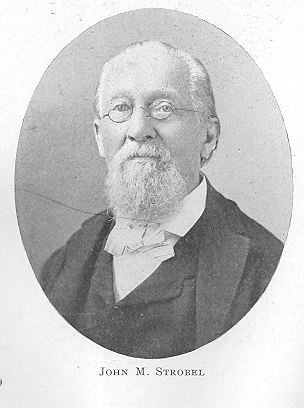
John M. Strobel, Of Ironton, Ohio, one of the most prominent musicians in the southern part of the State, was born on the 18th of June, 1826, at Neustadt on the Eisch, Bavaria, Germany. His father, John Strobel, was a well-known weaver and innkeeper Cita his country. Mr. John M. Strobel received a careful education, both literary and musical, in Germany, until he had reached the age of seventeen, when he emigrated to the United States. After a long and tedious journey he finally landed in New Orleans, from where he came o Cincinnati. He has been closely identified with the early history of music in Ohio, and has probably done more for the development of this beautiful art in this State than any other musician. Shortly after his coming to Cincinnati, Mr. Strobel accepted a place in the orchestra of the old Shiras Theater. That at one time. celebrated temple of the muses sood at the site of the present Burnet House. Mr. Strobel also played at the National Theater, Woods Theater and the old Pike. All these theaters have disappeared. They are a part of the musical history of Cincinnati, and the reminiscences Mr. Strobel tells sound like tales from days of a former generation, of days long gone
- 769 -
by. After staying for a while in Cincinnati, Mr. Strobel went o Little Rock, Arkansas, remaining there and playing in a theater for a period. of one year and four months. From Little Rock he went o New Orleans, accepting positions in the St. Charles and American Theaters. While in New Orleans he diligently studied under well-kriown teachers, finishing his musical training. For three years Mr. Strobel was identified with the music interests of the Crescent City. Then he returned o Cincinnati, where he remained until 1865. During this time he became the foremost of the Cincinnati musicians and teachers, and among the pupils he taught were a great many whose names became enrolled with golden letters in the History of Music of the United States. It was Mr. Strobel who first developed a taste for the very best in music among the citizens of Cincinnati. It was he who, after gigantic preliminary work, gave and directed the first three Symphony Concerts heard in.the Queen City. This was as early as 1849. Mr. Strobel's orchestra consisted of thirty musicians, and the concerts were given in the old German Theater. In 1865 Mr. Strobel became the proprietor of the Ironton House, a famous hostelry at Ironton, Ohio, and has up to the present writing retained his interests in that well-known hotel. His musical interests, however, have called him o Cincinnati during many periods of this time, until 1890, from which date he has permanently resided in Ironton. It should be mentioned as an evidence of the musical training of Mr. Strobel that in 1860, when the Prince of Wales, the present King Edward of England, visited the United States and for a short time was entertained in Cincinnati, Mr. Strobel had charge of the music for the ball given in the old Pike's Theater in honor of that distinguished gentleman. While the winter of life has whitened the hair of Mr. Strobel and nearly four score years have indelibly marked their passing in the once vigorous frame of that gentleman, he still retains all his mental faculties and the same love for the beautiful art o which he has devoted his life. While Mr. Strobel has retired from active business life, he retains some favorite pupils, teaching them, as so many others before, the principles of perfect violin playing. Unlike the majority of men, Mr. Strobel can look back over half a century of a happy wedded life, with the partner of his life still living and the six children born to him all surviving and participating in the golden wedding, celebrated in 1903. One of his sons is superintendent of the Philadelphia branch of Niles Crane Works.
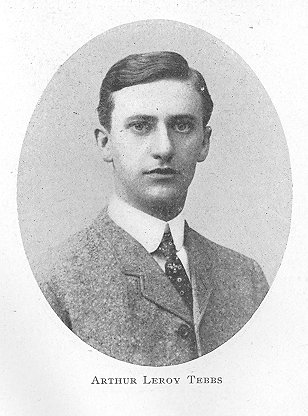
Arthur Leroy Tebbs, A musician of pronounced ability, of Dayton, Ohio, was born on the 17th of April, 1876, in the city of Harrison, this State. His father, a merchant, John F. Tebbs, as also his mother, Sarah Tebbs, was a native of the Buckeye State. He is of French-German ancestry, and is a descendant of the famous General Fouche, one of the great Napoleon's Generals. Air. Tebbs obtained his education in the public schools of Harrison and at the Woodward High School at Cincinnati. When a boy he early developed a talent for music, and after careful deliberation it was decided by his family to give him the advantages of a musical
- 770 -
education. Consequently, he was enrolled as a pupil in the College of Music in Cincinnati, where he remained until he graduated in 1897. He also took special lessons under prominent Cincinnati and New York masters. At the age of twenty-two Mr. Tebbs took up, his musical career as Supervisor of Music in the public schools of Lawrenceburg, Indiana, remaining there for a period of two years. At present Mr. Tebbs is in Dayton, Ohio, in the capacity of instructor of voice culture. He also has a large class of pupils in Richmond, Indiana. Since Mr. Tebbs became engaged in his profession he has done much chorus work. He was chorus director and soloist of the Linden Avenue Baptist Church and the First Presbyterian Church. He is now director and soloist of the First Baptist Church at Middletown. On the 16th of June, 1904, he was united in marriage to Miss Katharine Evans. His studio is in the McIntyre Building, Dayton, Ohio. Mr. Tebbs has succeeded in establishing a large and lucrative practice, and is conceded to be a conscientious, painstaking and competent teacher of music. Many of the best families in the cities in which he has become identified entrust o his tuition their children. As -a soloist Mr. Tebbs has acquired an enviable reputation.
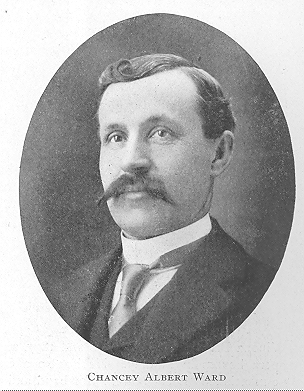
Chancey Albert Ward, Teacher of music at Fostoria, Ohio, and Principal of the Music Department of the Ohio Normal School of that city, was born on the 17th of November, 1862, at Aylmer, Canada. His father, Samuel Ward, was a shoemaker and of English parentage, while his mother, Mrs. Sarah Matilda Freeland. Ward, was of Pennsylvania Dutch descent. Mr. Ward received his education in the public schools and the Fayette Normal Music and Business College, graduating from same in 1886. He also studied with Dr. Robert Goldbeck and A. J. Goodrich. He began teaching in 1884, working his way through school in that manner. Mr. Ward is considered the most successful teacher of music in Fostoria, and he always has a large class of pupils. For one and a half years he was engaged in a general music merchandise store, owning a half interest, at Fostoria, but sold his interest in order o resume teaching. Mr. Ward is a composer of note. His most pretentious composition, a sacred cantata, "The Coming of the Ring," was published by Fillmore Bros., of Cincinnati. Among his other compositions may be mentioned "Company D" March and Two-step, "Yacht Club" March ; "Sweet Evening Breeze," waltzes ; "Waiting," a song for soprano and others. Professor Ward has led church choirs since he was sixteen years of age. He now is the conducor of a choir of thirty voices, and often gives cantatas and occasionally an oratorio. On the 28th of January, 1891, he was married o Miss Emma J. Wagner. They have one daughter, Margaret Louise. Mr. Ward is a member of the Protestant Episcopal Church. He is a Democrat, and belongs to the Knights of Pythias. Professor Ward lives with his family at No. 311 South Wood Street, Fostoria, Ohio.
- 771 -
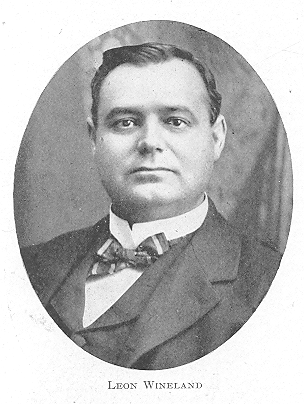
Leon Wineland, Professor of Instrumental Music at Findlay College, Findlay, Ohio, and teacher of music in that city, has a place among the foremost musicians in the northwestern part of the State. He was born on the 31st of March, 1863, in Cass Township, Hancock County, Ohio, and is the son of Benjamin F. Wineland and Caroline (Nelson) Wineland, both natives of Pennsylvania. His father was a man well and favorably known in that portion of Ohio. On the 14th of October, 1862, he was mustered into service of the United States army as a private, and afterwards promoted to First Sergeant. On the 24th of June, 1865, he was transferred o the One Hundred and Eighty-third O. V. I., and mustered out on the 12th of July of the same year, at Salisbury, North Carolina, as supernumerary. He also filled the office of Township Treasurer for about twelve years and of County Commissioner for six years. Mr. Leon Wineland enjoyed a careful education in the public schools of Findlay. His musical education was obtained in a private school under Abraham Fielding, at Findlay, for two years, and afterwards under Professor Wertheim, of Fremont, Ohio, for five years. He afterwards went o Europe and finished his musical education at the Berlin Conservatory of Music, where he studied for two years under such masters as Professors John Hasse, Fred. Friederichs and others. He holds the degree of Bachelor of Music. At the age of twenty years Professor Wineland took up his profession of teaching music, in which he has been extraordinarily successful. Outside of being a teacher of music and professor of the musical department of Findlay College, Mr. Wineland is conductor of the orchestra at Reeves Park, in the neighborhood of Findlay. He has been leader of several bands and orchestras ; was musical direcor of Presque Isle in 1885 ; of Winona Park, Indiana, in 1896 and 1897, and for the last twenty years director in the various opera. houses in Findlay. He is also a composer of note. Among his compositions may be mentioned "Leola March," for band and orchestra ; "Elks March," dedicated to Findlay Lodge, No. 75, B. P. O. E., and "Cadets' Patrol," for the Cadets of Findlay, a military organization of said city. Socially, Mr. Wineland is a member of the Elks, Knights of Pythias, Modern Woodmen of America, and the Eagles. He has been married twice. On the 12th of June, 1895, he was united in marriage to Miss Johanna Wertheim, daughter of a prominent musician at Fremont, and is the father of two children, Samuel and Caroline, aged 13 and 6, respectively. He lives with his family at No. 302% North Main Street, Findlay, Ohio.
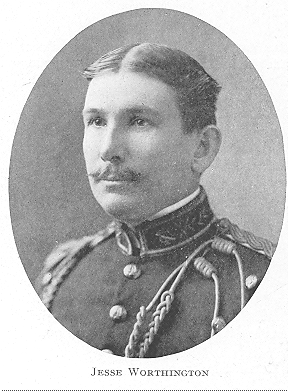
Jesse Worthington, Among the younger musicians of Ohio few are better and more favorably known than Mr. Jesse Worthington, of Columbus, Ohio, the leader of the Fourth Regiment Band of that
- 772 -
city. He is regarded by the best critics one of America's masters of the cornet, and his many public appearances in different parts of the State, in connection with his famous band, as a soloist, have made his name known o prac-tically all the people in this part of the country. Mr. Worthington is a native of Ohio. His father, D. I. Worthington, is one of the most prominent exponents of law at Washington Court House, Ohio. Mr. Jesse Worthington had the advantages of a very thorough early education, both literary and musical. At an early age he showed a remarkable musical talent and consequently was carefully instructed in his art. When but a:boy he commenced the study of his favorite instrument under competent teachers, and advancing with wonderful rapidity, he was put under the care of the great comet virtuoso, Hermann Bellstedt, of Cincinnati, with whom he soon became a favorite pupil. Mr. Worthington's playing is characterized by a pure and beautiful tone, ease and brilliancy of execution and a forceful style possessed only by .the best artists. He is acknowledged to be the leading teacher of his instrument in the Capital City. As conductor of the Fourth Regiment Band he enjoys a well-earned reputation. Mr. Worthington resides in Columbus, Ohio.
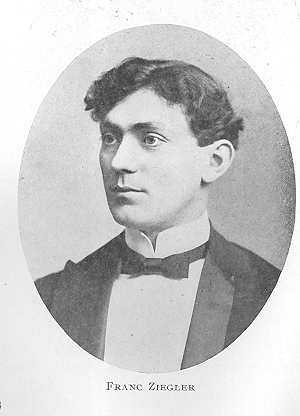
Franc Ziegler, Of Columbus, Ohio, violin soloist and teacher of music in the capital city of the Buckeye State, is a native Ohioan, being born, bred and educated in his native State. In early youth he demonstrated a wonderful ability for music and upon its manifestation was given in care of the very best teachers obtainable. Desiring to receive a European education and to finish his studies in the musical centers of the Old World, Mr. Ziegler, at the age of nineteen, crossed the Atlantic and for six years studied music at Leipsic and Berlin, in which cities he was the favorite pupil of such world-renowned masters as Joachim, Halir, Hilf, Markees and Herman, men whose achievements in the world of their art have made their names famous the world over. r. Ziegler's superior talents and ability won almost imme-diate recognition in the city of Berlin, and he, with four others, were the only pupils out of
- 773 -
sixty-five applicants who were admitted to the famous Royal High School of Music, acknowledged the greatest violin school in the world. While in that institution, he became a favorite of the great Joachim, and was appointed one of the leading first violins of the celebrated High School Orchestra. Mr. Ziegler graduated from the Royal High School of Music with the highest honors, and won the unstinted praise of the best musical critics. In the city of Leipsic he was first violinist of the world-renowned Gewandhaus Orchestra, and played under the direction of the world's greatest conductors and composers, such as Brahms, Rubinstein, Griegg, Reinecke and others. An unusual honor conferred upon Mr. Ziegler was the unsolicited offer of a free scholarship in the Royal Conservatory of Leipsic and a permanent position in the Royal Thea ter Orchestra. This offer was not accepted, however, as Mr. Ziegler felt that his best interests would be conserved by his presence in America. Before returning o his native shores, Mr. Ziegler made a concert tour of the principal cities of Germany, and met with unqualified success as a violin virtuoso. After returning to Columbus, he immediately took up the practice of his profession, in which he has been eminently successful, and those who are so fortunate to be under his instructions advance with unusual rapidity, as Mr. Ziegler imparts to them the same superb methods he acquired from the masters of the Old World. Since his return to America, Mr. Ziegler's time has been constantly filled with concert engagements, as well as teaching his many pupils.
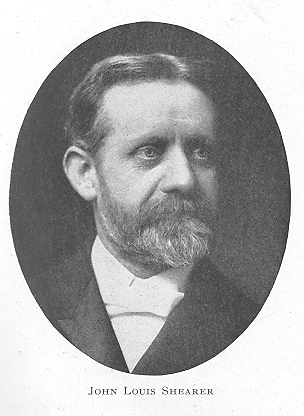
John Louis Shearer, Superintendent of The Ohio Mechanics' Institute at Cincinnati, Ohio, was born at Lengfurt, near Wurzburg, in Bavaria, Germany. His father, Philip Scherer, was the owner of a small landed estate, and a maker of spinning-wheels. The mother, by the maiden name of Margaretha Liebler, was the daughter of an estimable citizen at Erlenbach, two miles distant. From earliest youth young Shearer had been impressed with the beauty of the natural scenery of the vine-clad hills bordering on the river Main and the rugged regions of the famous Spessart Mountains. The historic Castle Triefenstein, with its extensive parks and forest preserves, were the scenes of many exploits of the youthful enthusiast. His early education was acquired in the public schools (Volksschule) of his native place, and subsequently, for three years, in a private school. At the age of nearly sixteen, young Shearer left his native land and came to America, but arrived at a most unfortunate time. The panic of that memorable year, 1873, made it almost impossible for him to obtain employment. However, after considerable patient search, work was found in a machine shop of Brooklyn, New York. There he attended a night school, where he acquired the elements of the English language, yet yearning for a broader practical knowledge. Having become accustomed to manual work from youth up in his father's shop, also in the fields
- 774 -